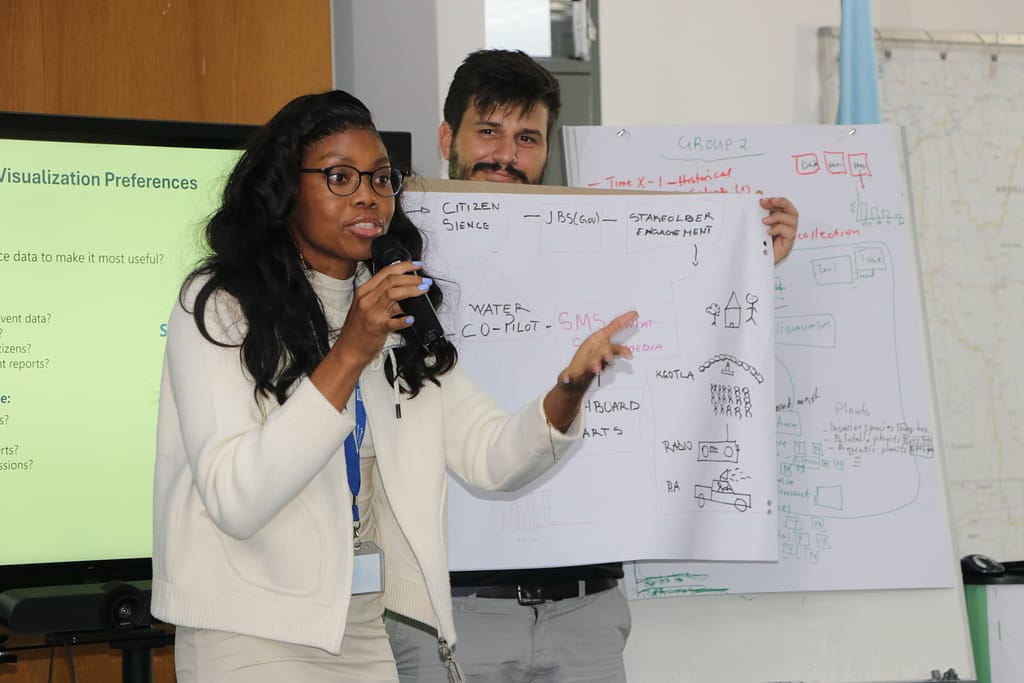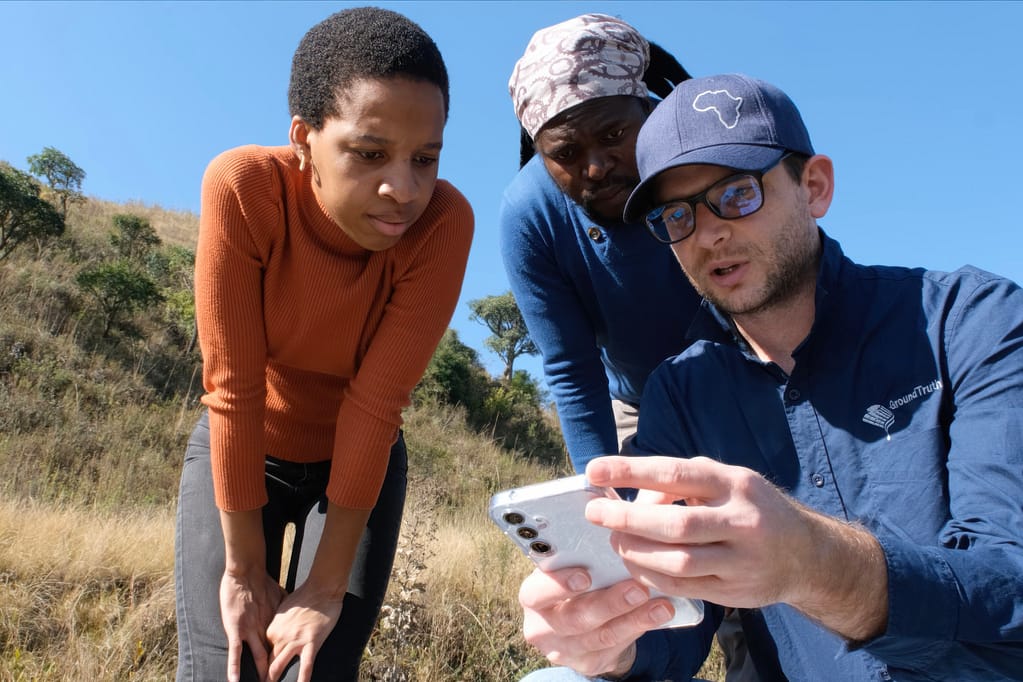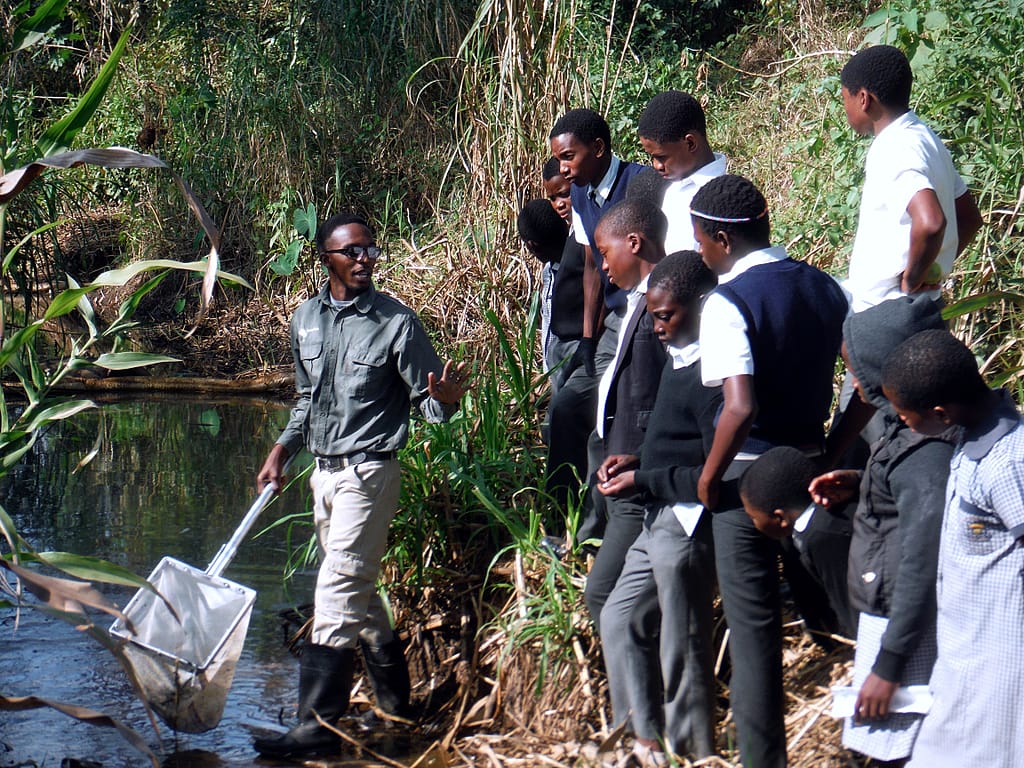
How can local communities work directly with authorities to preserve and manage their water sources? A new initiative of the International Water Management Institute (IWMI), funded by Enabel, the Belgian agency for international cooperation, is building a network of citizen scientists to assemble data on water quality and availability across southern Africa.
The Limpopo River Basin is a vital source of freshwater for millions of people across five countries: Botswana, Mozambique, South Africa, Tanzania and Zimbabwe. To support the Limpopo Watercourse Commission (LIMCOM), IWMI has developed a Digital Twin for the basin that provides an advanced virtual representation enabling water managers to visualize real-time data, model data and watershed processes for forecasting on water availability and quality.
To represent the dynamics of the river system, the Digital Twin requires several datasets. However, with limited resources and infrastructure there are many gaps in the available data. This brings in the opportunity for citizen science to fill in crucial gaps, while providing a platform for local communities to be heard in the decision-making process. As Henry Roman, IWMI country representative for South Africa, explains: “We are seeking to democratize data collection.”
By working with partners like GroundTruth, a multidisciplinary consulting company with deep experience supporting citizen science in southern Africa, and the Association for Water and Rural Development (AWARD), a prominent South African non-profit organization dedicated to advancing integrated water resource management, rural development, and environmental resilience, IWMI has already made important progress. The MiniSASS app digitizes and streamlines ground surveys for data collection, monitors data quality and incorporates machine learning to auto-verify readings, a critical aspect for data collection through a citizen science approach. The tool has been adopted by the EnviroChamps citizen science group in South Africa and is included on UNICEF’s YOMA platform which provides incentives for youth participation.
With the grant provided by Enabel, IWMI aims to increase the number of participating citizen science groups and improve on and expand the digital tools used. IWMI is working on the technical architecture to bring citizen science into the Digital Twin application for decision-makers, while IWMI is researching incentives and benefits for local communities to participate.


Building capacity and incentivizing communities
“In the last decade or so, citizen science has been gaining momentum, so it is timely for this creation of a citizen science association for South Africa has just been established,” said Roman.
As part of an ongoing initiative, the project aims to engage stakeholders to identify citizen science groups across all LIMCOM member countries with a broader goal of establishing a transboundary network of at least 80 active citizen scientists contributing 10,000 data points annually. These community members will receive training and support to become integrated into the network.
Nicole Langa, a research officer at IWMI, has been working to develop a model to incentivize citizen scientists based on theoretical frameworks. The model begins with raising awareness, followed by onboarding and training the stakeholders in citizen science methodologies. The subsequent phases focus on deepening engagement through the provision of logistical support such as transportation, protective gear and data collection equipment.
“We will overcome the digital divide by teaching citizen scientists how to incorporate digital technologies,” said Langa. “There will also be regular feedback sessions and reports so there is clear communication between us and citizen scientists on how their data is being used.”
A central part of the initiative is to support the citizen scientists and communities who are part of the program. Moreover, through the YOMA platform, IWMI’s partnership with UNICEF allows citizen scientists to benefit from training or incentives such as grocery vouchers in return for their data. Partnerships with other organizations could lead to incentives such as swimming lessons, for example. YOMA allows young people to build up a blockchain-based CV that recognizes their skills and contributions in citizen science. Communities that contribute large amounts of data will be able to engage and interact with local authorities on issues they have identified.
“You also end up with unintended good consequences,” added Roman. “Citizen scientists such as the EnviroChamps form a social network. When there was a flooding event, they saved lives by evacuating people on time. Or take business opportunities, for example, when a lady started a recycling business and employed people from the social network in her business.”
These best practices demonstrate the community perspective for localized initiatives towards protecting the environment along with exploring economic opportunity in hand with taking ownership of it.

LIMCOM is advancing the Digital Twin and Citizen Science initiative under the project “Integrated Transboundary River Basin Management for the Sustainable Development of the Limpopo River Basin,” which aims to uplift the living standards of the basin’s population and conserve the basin’s resources and ecosystem services. LIMCOM is implementing the project in partnership with the Global Water Partnership Southern Africa (GWPSA), with support from the United Nations Development Programme (UNDP) through funding from the Global Environment Facility (GEF).
















